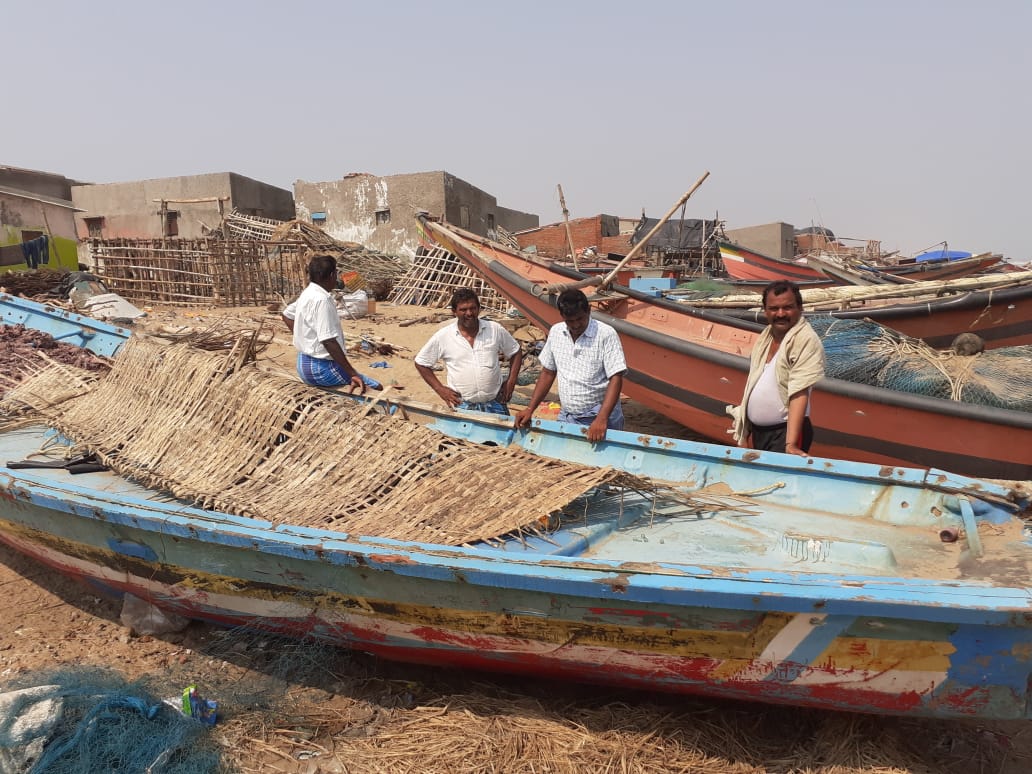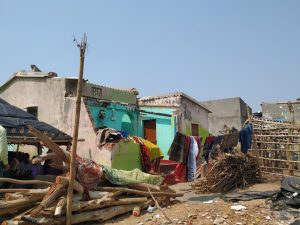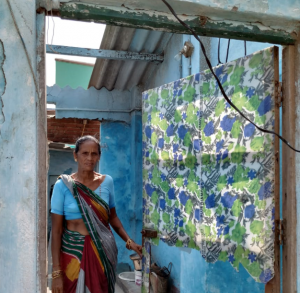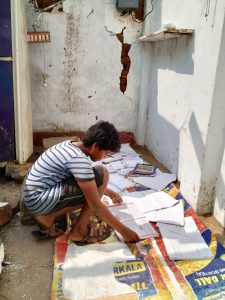
Cyclone Fani: Puri fisherfolk caught in troubled waters

At 12 o clock on a muggy Tuesday afternoon, a lone country boat inches closer to the shore at the Penthakata beach of Puri. It is usually the time of the day when the ‘nolias’ (fishermen), who leave for the high sea in the wee hours, return home with the catch of the day. Boats are anchored and fish is unloaded to be sold to traders, waiting at the beach. The rest of the day is spent in repairing the nets, storing any extra catch or attending to domestic chores.
The devastation
Today, a strange lull and air of despondency rule the place. To enter Penthakata’s Pedurbarpa locality, located bang on the Puri beach one would have to negotiate their way through piles of concrete debris and wood from fallen trees, only to see more roofless houses, crumbled boundary walls, scattered piles of utensils and damaged fishing gear, lying in mounds along the narrow path. The beach adjoining the fishermen’s hamlets is a mess of battered and engine-less boats, tangled nets and debris from houses left behind by Fani. It is just one locality. There are several others where fishermen living along the coastline of the Bay of Bengal in Puri district have been the immediate victims of Cyclone Fani.

“We have weathered the super cyclone of 1999 and the others that followed. But we had not anticipated Fani to be so destructive. We had anchored our boats almost 100 metres away from the beach, but the winds were strong enough to tear them away from their anchors and fling them in the air. We watched helplessly from the cyclone relief shelter as many of these boats landed on rooftops, damaging our houses. Our nets worth lakhs have been damaged. Many were buried in the sand. Others still need to be dug out,” says K Veerbabu, a fisherman.
The four wards of Penthakata are home to almost 8,000 fishermen families, a majority of them Telugu-speaking families, whose ancestors migrated to Puri from the neighbouring state of Andhra Pradesh..
“Around 90 per cent of these families have been hit by the cyclone,” says Dibyakanta Nayak, the state coordinator of Reliance Foundation that is coordinating with the government with relief and rehabilitation work in the locality.

A preliminary survey of damages assessed by the district fisheries department pegs the number of boats fully damaged in the marine sector of Puri district at 3,100, number of boats partly damaged at 1,440, number of nets fully damaged at 3,680 and number of nets partially damaged at 2,150.
“The department is yet to make a complete assessment of the damages and announce compensation to fishermen,” said Debendra Kumar Behera, additional director of Fisheries.
The phrase ‘life is limping back to normalcy’ means nothing to these ‘nolias’. While the government relief of 50 kg rice, Rs 2000 and tarpaulin sheets have keep their hearths burning, it may take months before their livelihood regains normal pace.
The pressing issue before them is to mend their boats and nets.
Fishermen say a motorised boat costs between ₹3 and ₹4 lakh while a net could cost upto ₹5 lakh. For many of them, several nets have been damaged by the cyclone.
“There are more than 1,200 boats in Penthakata and it will take at least 45 days to mend the boats and the nets. The repair would cost between ₹10,000 and ₹20,000. The anchors and the engines have been badly damaged. Most of the work needs electricity and it may take a while for the same to be restored in Puri district,” says K Tatabhai, another fisherman.
This is the time of the year, when the state imposes a fishing ban (from April 15 to June 14), in view of the breeding season. At this time small dinghies – less than 28 feet in length – are the sole saviours of the fishing community. But while the cyclone has broken many of these dinghies, the ones that go to the sea do not bring enough fish to feed the fishermen families.
“Say we mend our boats by ourselves and start fishing, where is the ice to store that fish? All the godowns are closed due to power shutdown in the city,” points out G Jagannath, an elder in the community and the secretary of the Srirama Youth Club.
Jagannath says around 20 boats carrying five or six men go to the sea every day. The entire community makes a business of almost ₹25 lakh per day. The fish apart from being bought by local dealers is sent to Tamil Nadu, West Bengal and Andhra Pradesh.
Women, who supplement their husbands’ income by working as daily wagers, rue that there will be no work for them until things come back to normal.

To add to their woes, residents say many houses in the locality were robbed on the night of the cyclone when they were in the cyclone shelters. “While the cyclone damaged electronic appliances, clothes and food items, robbers stole cash and jewellery by breaking into lockers. Now I don’t even have a spare sari to change,” says Soka Nolamma, a 50-year-old resident.
Relief not a relief
Many have pointed fingers at the disorganised way of relief distribution, both by the government and NGOs. .
“I have a BPL card, a voter card, an Aadhar card and a ration card. But officials say my name isn’t on the beneficiary list. What is the use of these cards when I can’t use to get a handful of rice?” asks Nolamma.
Many have returned home empty handed even after standing in the relief centre for hours. “My husband has been waiting in the queue for three days, but returns home empty handed every day. The relief centres opens at 10 and closes sharp at 5pm, irrespective of the waiting queue outside it,” says K Sangeeta Patra, whose house has been damaged in the cyclone.
While several NGOs have been visiting the area, residents say most of them trust influential people with the relief material and they in turn distribute it among their acquaintances, leaving no uniformity in distribution.
Dibyakanta Nayak said his NGO is making a list of affected families with and without ration cards, and plans to distribute a ration kit, utility kit and a sanitary kit to almost 12,000 families soon.
Praises for Andhra Pradesh
Telugu fishermen in the neighbouring hamlet of Nalipitti Basti in Baliapanda, have similar grievances. They are ferociously critical of political parties, which till a few days ago, were frequent visitors to the locality. “Where are the leaders of BJP, BJD and Congress who just a fortnight ago behaved as if they were our own kin? Where is Maheswar Mohanty (MLA of Puri constituency) and his sugar-coated words before the elections? Apart from a few NGOs and government officials who came for assessment, no politician has come to ask us about our wellbeing,” says Bijuli Behera.
If there are disparaging words for the Odisha government, there are applauses for the Andhra Pradesh government. Resident say many NGOs from Andhra Pradesh have been visiting them with relief after the cyclone.
“I am sure, the Andhra Pradesh government would have done a much better job in such a situation. During the Andhra floods in 2009, the government had sent everything including sufficient food and clothing for the affected families. The distribution was much more organised,” says A Gopal Behera, who used to work as a security guard in Andhra 10 years ago. He is one of the many Telugus in Baliapanda fishing hamlet who switched to an Odia surname to be socially acceptable.

The fishermen community at Nalipitti Basti say they have no other alternative but take their remaining boats to the sea, despite the ban on fishing. They say only five boats are left of 40 households. “For how long will Rs 2000 and 50 kg of rice feed us? If we don’t get new boats, we will be forced to work as daily wagers somewhere else,” says K Das, a fisherman in the area.
Fisheries department officials said registered fishermen are already covered under the Rashtriya Krishi Vikas Yojana and are eligible for subsidy to buy boats under the Blue Revolution scheme of the government. “But the government is yet to announce the compensation for fishermen affected in Fani. Initial reports say fishermen have been affected in Penthakata, Goudabada Sahi, Bali Noliasahi, Chandrabhaga, Astarang, Brahmagiri and Krushnaprasad in Puri district. Damage assessment is still underway and once that is completed, we will have to cross check the findings with information of boats and fishermen registered under the government. Only those found to be genuine will be eligible for compensation. The process is long and the shutdown of power is making it lengthy,” explains an official at the district fisheries department.

